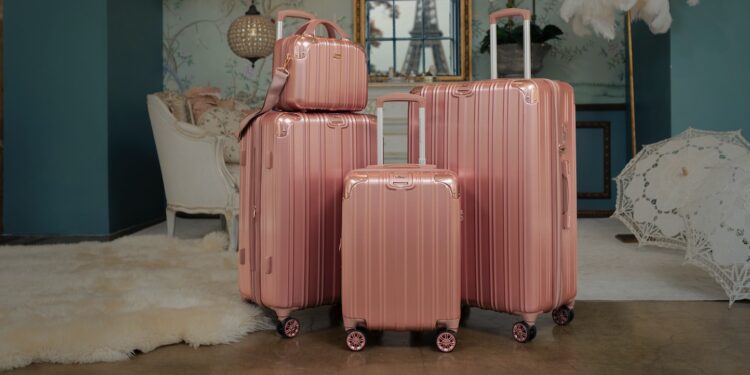When it comes to choosing luggage, two popular materials often used for hard shell suitcases are polycarbonate and ABS (Acrylonitrile Butadiene Styrene). Both materials have their advantages and considerations, so let’s compare them to determine which is better for luggage.
If you’re looking for new luggage before you travel, check out our buying guides: best suitcase deals | best suitcases under £50 | ultra lightweight suitcases | checked luggage for international travel | aluminium suitcases | underseat suitcases with wheels | zipperless suitcases | extendable suitcases | suitcases for cruises | extra large suitcases | durable suitcases | Tripp suitcases. And for essential travel accessories, we recommend: compression suitcase packing cubes | GPS luggage tracker | passport covers | vanity cases
Polycarbonate:
Polycarbonate is a high-performance thermoplastic known for its exceptional strength and durability. Here are its key features:
- Strength and Impact Resistance: Polycarbonate is highly resistant to impacts, making it an excellent choice for luggage. It can withstand rough handling, drops, and other potential hazards during travel without cracking or breaking easily. This feature ensures that your belongings remain protected even in demanding conditions.
- Lightweight: Polycarbonate is significantly lighter than many other materials used for hard shell suitcases, such as aluminum. This makes polycarbonate luggage easier to maneuver and carry, particularly when you have weight restrictions or need to lift your suitcase frequently.
- Flexibility: Polycarbonate has a certain degree of flexibility, allowing it to absorb and distribute impact forces. This helps prevent the material from cracking under pressure, further enhancing the durability of polycarbonate luggage.
- Scratch Resistance: Polycarbonate has good scratch resistance, which helps maintain the appearance of your luggage over time. However, it’s worth noting that it may still show some signs of wear with heavy use.
ABS (Acrylonitrile Butadiene Styrene):
ABS is a common thermoplastic material used in various applications, including luggage manufacturing. Let’s examine its characteristics:
- Affordability: ABS is generally less expensive compared to polycarbonate, making ABS luggage more budget-friendly. This can be an important consideration if you’re looking for a cost-effective option.
- Impact Resistance: While ABS offers decent impact resistance, it may not be as robust as polycarbonate. It can withstand moderate impacts and normal travel conditions, but it may be more prone to cracking or denting under severe force or rough handling.
- Lightweight: ABS is lighter than some other materials like aluminum, but it is slightly heavier than polycarbonate. Nonetheless, ABS luggage is still relatively lightweight and manageable for most travelers.
- Surface Durability: ABS luggage is generally more prone to scratches and scuff marks compared to polycarbonate. While these surface imperfections may not affect the functionality of the suitcase, they can impact its visual appeal over time.
Which is Better for Luggage: Polycarbonate or ABS?
Both polycarbonate and ABS have their advantages and considerations, so the choice depends on your specific needs and preferences.
Polycarbonate is an excellent choice if you prioritize durability, impact resistance, and lightweight design. It offers superior protection for your belongings, especially during rough travel conditions. Polycarbonate luggage tends to be more expensive, but the added investment is often worth it for its long-lasting performance.
ABS, on the other hand, is a suitable option if you’re looking for a more budget-friendly choice. While it may not offer the same level of impact resistance and scratch resistance as polycarbonate, ABS luggage can still provide adequate protection for typical travel scenarios.
Ultimately, consider your travel habits, the level of durability and protection you require, and your budget when making a decision between polycarbonate and ABS luggage. Regardless of the material you choose, prioritize purchasing luggage from reputable brands known for quality construction and craftsmanship.




